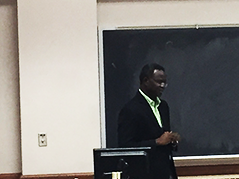 This semester the International Food Security at Illinois program is cooperating with the Division of Nutritional Sciences to offer a semester-long lecture series on the “Right to Food, Food Assistance, and the Biological Consequences of Malnutrition.” This series seeks to ground a discussion of a right to food and programs to ensure that right is realized in the latest discoveries about the physical effects of food inadequacy.
This semester the International Food Security at Illinois program is cooperating with the Division of Nutritional Sciences to offer a semester-long lecture series on the “Right to Food, Food Assistance, and the Biological Consequences of Malnutrition.” This series seeks to ground a discussion of a right to food and programs to ensure that right is realized in the latest discoveries about the physical effects of food inadequacy.
The series serves as a graduate seminar (DNS 500) and is also open to the campus community at large.
Kicking off this dynamic seminar series, Dr. Batamaka Somé, an anthropologist and an alumnus of the University of Illinois, spoke about providing sustainable access to food through agricultural development programs that represent indirect forms of food assistance.
Throughout his career, Dr. Somé has provided technical advising to non-government, philanthropic and humanitarian organizations, including The Bill & Melinda Gates Foundation and the United Nations World Food Programme. He currently works as a research consultant for McKnight Foundation and is based in Burkina Faso.
Somè started with the principle that “Hunger is a moral issue,” and the right to food can be promoted through agricultural interventions that promote food security. He then highlighted three programs that support smallholder farmers in ways that increase their access to food and the availability of food for others:
- World Food Programme Purchase for Progress (P4P)
- USAID’s integrated approach towards building resilience (RISE)
- McKnight Foundation’s CCRP approach
The World Food Programme’s P4P project uses its purchasing power to develop agriculture markets and support smallholder farmers’ engagement in these markets. “This program has a conscious focus on gender and women’s empowerment,” he added. Read more about this program here.
USAID’s Resilience in the Sahel Enhanced (RISE) program brings together the agency’s humanitarian and development assistance to address the root causes of persistent vulnerability. It was introduced after the Sahel region’s third serious drought in 2012 for 18 million people who were facing severe food and nutrition insecurity. RISE promotes country-led plans that are ready to adapt to shocks and chronic stresses in these environments. Read more about this program here.
Dr. Somé also spoke about the collaborative crop research programs (CCRP) supported by his employer McKnght Foundation, specifically one that uses urine for crop fertilization and has improved production and maintained soil quality.
In closing, Dr. Somé emphasized understanding the processes not just seeing the end result. He presented an “axis of smallholder empowerment” with three inputs that feed into each other, working together to empower farmers: social empowerment, capacity building, and economic empowerment.
The “Right to Food, Food Assistance, and the Biological Consequences of Malnutrition” Seminar Series will host speakers addressing similar themes from many other perspectives, including biological and the legal.
The series demonstrates the transdisciplinary nature of food issues and the remarkably transdisciplinary nature of our campus.
More about Dr. Some:
Batamaka Somé has conducted work in agriculture and gender, mainly focusing on rural livelihoods strategies, food security, agricultural productivity and market access, women’s economic empowerment, and cash crop farming in Africa.
Dr. Somé’s research on the economic impacts of poultry-raising on rural households convinced the Philanthropist Bill Gates, who featured him on his personal blog: https://www.gatesnotes.com/Development/Why-I-Would-Raise-Chickens. Dr. Somé also drafted The WFP West and Central Africa Bureau’s Regional Gender Strategy for 2015-2020, and reports on local governance of natural resources and climate change adaptation among pastoralists for the International Livestock Research Institute. He currently works as the Regional Representative of the West Africa Community of Practice (CoP) of the McKnight Foundation’s Collaborative Crop Research Programme. Prior to embracing the international development work, he garnered 15 years of teaching in high school and higher education.
Dr. Somé holds a BA in English, a Master’s degree in African literature, and a Postgraduate Diploma in Teaching Education from the University of Ouagadougou (Burkina Faso). He also holds a Masters and a PhD in Sociocultural Anthropology and a Master’s Certificate in Gender Relations in International Development from the University of Illinois at Urbana-Champaign.
Article submitted by Leslie Myrick, 217-244-5373
Sources: No sources found